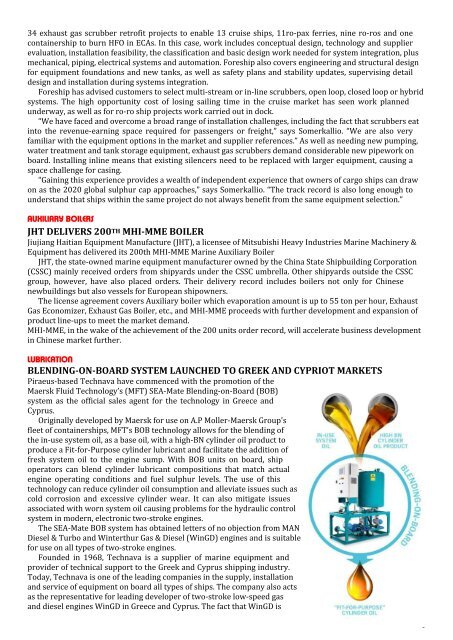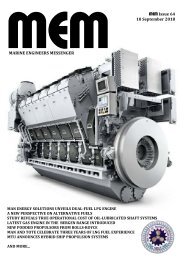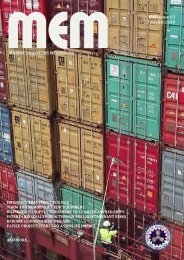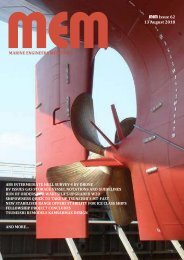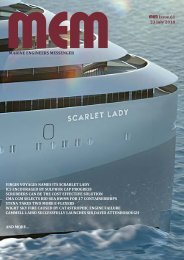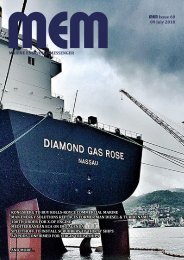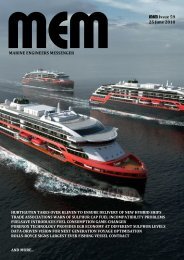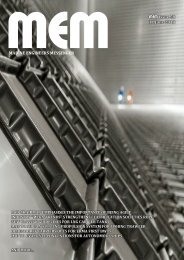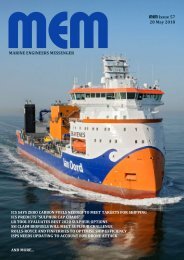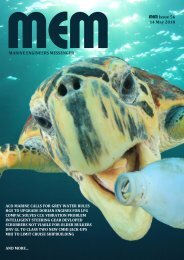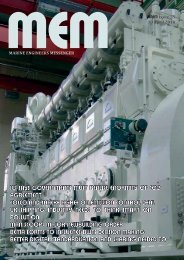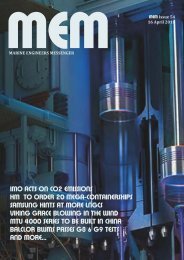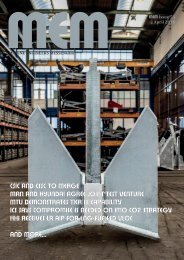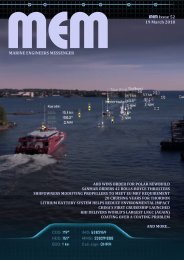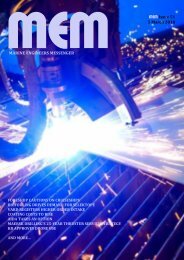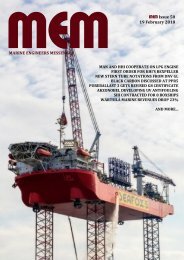MEM47
Marine Engineers Messenger, Volume 3, Issue 47
Marine Engineers Messenger, Volume 3, Issue 47
You also want an ePaper? Increase the reach of your titles
YUMPU automatically turns print PDFs into web optimized ePapers that Google loves.
34 exhaust gas scrubber retrofit projects to enable 13 cruise ships, 11ro-pax ferries, nine ro-ros and one<br />
containership to burn HFO in ECAs. In this case, work includes conceptual design, technology and supplier<br />
evaluation, installation feasibility, the classification and basic design work needed for system integration, plus<br />
mechanical, piping, electrical systems and automation. Foreship also covers engineering and structural design<br />
for equipment foundations and new tanks, as well as safety plans and stability updates, supervising detail<br />
design and installation during systems integration.<br />
Foreship has advised customers to select multi-stream or in-line scrubbers, open loop, closed loop or hybrid<br />
systems. The high opportunity cost of losing sailing time in the cruise market has seen work planned<br />
underway, as well as for ro-ro ship projects work carried out in dock.<br />
“We have faced and overcome a broad range of installation challenges, including the fact that scrubbers eat<br />
into the revenue-earning space required for passengers or freight,” says Somerkallio. “We are also very<br />
familiar with the equipment options in the market and supplier references.” As well as needing new pumping,<br />
water treatment and tank storage equipment, exhaust gas scrubbers demand considerable new pipework on<br />
board. Installing inline means that existing silencers need to be replaced with larger equipment, causing a<br />
space challenge for casing.<br />
“Gaining this experience provides a wealth of independent experience that owners of cargo ships can draw<br />
on as the 2020 global sulphur cap approaches,” says Somerkallio. “The track record is also long enough to<br />
understand that ships within the same project do not always benefit from the same equipment selection.”<br />
AUXILIARY BOILERS<br />
JHT DELIVERS 200TH MHI-MME BOILER<br />
Jiujiang Haitian Equipment Manufacture (JHT), a licensee of Mitsubishi Heavy Industries Marine Machinery &<br />
Equipment has delivered its 200th MHI-MME Marine Auxiliary Boiler<br />
JHT, the state-owned marine equipment manufacturer owned by the China State Shipbuilding Corporation<br />
(CSSC) mainly received orders from shipyards under the CSSC umbrella. Other shipyards outside the CSSC<br />
group, however, have also placed orders. Their delivery record includes boilers not only for Chinese<br />
newbuildings but also vessels for European shipowners.<br />
The license agreement covers Auxiliary boiler which evaporation amount is up to 55 ton per hour, Exhaust<br />
Gas Economizer, Exhaust Gas Boiler, etc., and MHI-MME proceeds with further development and expansion of<br />
product line-ups to meet the market demand.<br />
MHI-MME, in the wake of the achievement of the 200 units order record, will accelerate business development<br />
in Chinese market further.<br />
LUBRICATION<br />
BLENDING-ON-BOARD SYSTEM LAUNCHED TO GREEK AND CYPRIOT MARKETS<br />
Piraeus-based Technava have commenced with the promotion of the<br />
Maersk Fluid Technology’s (MFT) SEA-Mate Blending-on-Board (BOB)<br />
system as the official sales agent for the technology in Greece and<br />
Cyprus.<br />
Originally developed by Maersk for use on A.P Moller-Maersk Group's<br />
fleet of containerships, MFT’s BOB technology allows for the blending of<br />
the in-use system oil, as a base oil, with a high-BN cylinder oil product to<br />
produce a Fit-for-Purpose cylinder lubricant and facilitate the addition of<br />
fresh system oil to the engine sump. With BOB units on board, ship<br />
operators can blend cylinder lubricant compositions that match actual<br />
engine operating conditions and fuel sulphur levels. The use of this<br />
technology can reduce cylinder oil consumption and alleviate issues such as<br />
cold corrosion and excessive cylinder wear. It can also mitigate issues<br />
associated with worn system oil causing problems for the hydraulic control<br />
system in modern, electronic two-stroke engines.<br />
The SEA-Mate BOB system has obtained letters of no objection from MAN<br />
Diesel & Turbo and Winterthur Gas & Diesel (WinGD) engines and is suitable<br />
for use on all types of two-stroke engines.<br />
Founded in 1968, Technava is a supplier of marine equipment and<br />
provider of technical support to the Greek and Cyprus shipping industry.<br />
Today, Technava is one of the leading companies in the supply, installation<br />
and service of equipment on board all types of ships. The company also acts<br />
as the representative for leading developer of two-stroke low-speed gas<br />
and diesel engines WinGD in Greece and Cyprus. The fact that WinGD is<br />
8


